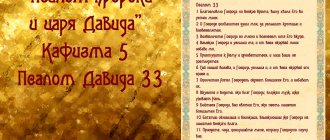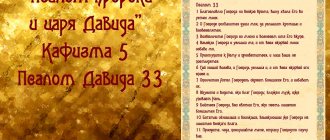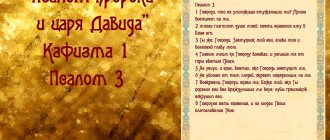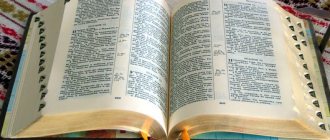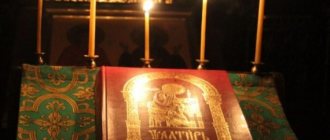Psalm 44
In the end, about those who are changed by the son of Kore, to the mind, a song about the beloved | For execution. About those who will change. The sons of Korah, for instruction. Song about the Beloved. |
| 1 My heart will vomit out good words; I will speak my deeds to the King: my tongue is the reed of a scribe. | 1 My heart has poured out good words; I declare my deeds to the King; My tongue is like a scribbler's cane. |
| 2 You are more beautiful in kindness than the sons of men; grace has been poured out on Your lips; for this reason God bless You forever. | 2 Blooming with beauty among the sons of men! Grace poured out from Your mouth, therefore God blessed You forever. |
| 3 Gird Your sword on Your thigh, O Mighty One. | 3 Thou shalt gird Thy sword upon Thy thigh, O Mighty One, |
| 4 By Thy beauty and Thy goodness, come and prosper and reign for the sake of truth and meekness and righteousness, and Thy right hand will guide You wonderfully. | 4 in Thy perfection and Thy beauty, and be strong, and prosper, and reign for the sake of truth, and meekness, and righteousness, and Thy right hand will lead You wondrously! |
| 5 Thy arrows are sharp, more powerful, the people under Thee will fall into the hearts of the enemies of the kings. | 5 Your arrows are sharpened, O Mighty One, the nations will fall before You, they are in the heart of the enemies of the King. |
| 6 Your throne, O God, is for ever and ever: a scepter of righteousness, a scepter of your kingdom. | 6 Your throne, O God, is forever and ever, a scepter of righteousness is the scepter of your kingdom. |
| 7 Thou hast loved righteousness and hated iniquity; therefore, for the sake of anointing Thee, O God, Thy God is the oil of gladness, even more He is a partaker of Thy. | 7 You loved righteousness and hated iniquity, therefore, O God, Your God anointed You with the oil of joy more than Your companions. |
| 8 Myrrh and stakti and cassia are from Your garments, from the weights of elephants, from which You made You glad. | 8 Myrrh, and balm, and cassia are from Your garments, from the palaces of ivory, from which they make You glad. |
| 9 Daughters of kings, in Your honor, the Queen appears at Your right hand, adorned with gilded garments. | 9 The daughters of kings are held in high esteem by You; the Queen appeared at Your right hand, dressed in a robe of gold and adorned. |
| 10 Hear, O daughter, and see, and incline Your ear, and forget Your people and Your father’s house. | 10 Hear, O Daughter, and see, and incline Your ear, and forget Your people and Your father’s house, |
| 11 And the King will desire Thy kindness: because of Thy Lord is Thy Lord, and thou shalt worship Him. | 11 For the King will desire Your beauty, for He is Your Lord. And you will worship Him, |
| 12 And the daughters of Tire with gifts, the riches of the people will pray to Your face. | 12 and the daughter of Tire with gifts; The rich of the people will plead for Your face. |
| 13 All glory is to the Daughter of the King within, robed with gold and speckled. | 13 All the glory of the King's Daughter is within; She is dressed and adorned with golden fringe. |
| 14 The virgins will be brought to the King after her, her sincere ones will be brought to You. | 14 The virgins will be brought to the King after Her, Her friends will be brought to You, |
| 15 They will be brought in with joy and joy, they will be brought into the temple of the Kings. | 15 They will be brought in with joy and joy, they will bring the King into the temple. |
| 16 Instead of Your fathers, Your sons became: I made you princes throughout all the earth. | 16 Instead of Your fathers, Your sons have become; You will make them princes throughout all the earth. |
| 17 I will remember Your name in every generation and generation. For this reason people will confess to You forever and ever. | 17 I will make Your name memorable in every generation and generation, therefore the nations will glorify You forever and ever. |
My heart will vomit out the word good, I will say my deeds to the princess: my tongue is the reed of a scribe and a cursive writer. You are more beautiful in kindness than the sons of men, grace has been poured out on your lips, for this sake God bless you forever. Gird Your sword upon Your thigh, O Mighty One. By Thy beauty and Thy kindness, come and prosper and reign for the sake of truth and meekness and righteousness, and Thy right hand will guide You wonderfully. Your arrows are sharp and powerful; people under You will fall into the hearts of the enemies of the kings. Thy throne, O God, is for ever and ever: a scepter of righteousness, a scepter of Thy kingdom. Thou hast loved righteousness and hated iniquity, therefore for the sake of the anointing of Thee, O God, Thy God is the oil of joy, and is more than a partaker of Thy. Myrrh and stakti and cassia from Your garments, from the weights of elephants, from which You made You glad. Daughters of kings, in Your honor, the Queen appears at Your right hand, adorned with gilded robes. Hear, O Daughters, and see, and incline Your ear, and forget Your people and the house of Your father. And the King will desire Your kindness: because of You is Your Lord and worship Him. And the daughters of Tire, with gifts, will pray to Your face for the wealth of people. All glory to the Tsar’s Daughter is inside, robed in gold and speckled. Virgins will be brought to the King in Her footsteps, Her sincere ones will be brought to You. They will be brought in joy and joy, they will be brought into the Temple of the Kings. Instead of your fathers there were your sons: I made you princes throughout the whole earth. I will remember Your name in every generation and generation. For this reason people will confess to You forever and ever.
We read the Psalter. Psalm 44
Audio |
Conversation with Archpriest Alexy Ladygin about the Psalter.
Dear brothers and sisters, let's continue talking about the Psalms - let's read the 44th Psalm. It begins with these words: “To the end, about those who are changed by the son of Korah, to understanding. Song of the Beloved." The deepest words in this inscription say: “to the end.” In the end - this is what will happen in the last times, this is the Coming of our Divine Savior to earth. In this psalm, the psalmist David speaks about Christ. This is evidenced by the inscription “about the beloved.” “This is My beloved Son,” says the Lord, when he testifies to the coming of Christ the Savior to fulfill His earthly ministry. And those who change are, of course, Christians who were born of water and the Spirit and were transformed in the sacrament of Baptism.
The psalmist David begins this psalm with these words: “I will cast out good words in my heart, I will speak my deeds to the princess.” “I will win back my heart’s word for good.” Here the Psalmist says: “Now I will speak to you about our Lord Jesus Christ, about the Divine Savior, who came into this world. And I will not just speak, but as it will come from my heart.” Some interpreters note that here not only what the psalmist David will tell us when prophesying about Christ, but also the Father Himself will address us with words about His Son. “I say I am my princess.” That is, “I will talk about the works that the Lord will do on this earth.”
“My tongue is the reed of a scribe.” The psalmist compares his tongue to the reed of a scribe. What's the secret here? A cursive scribe writes with a cane, but the cane, of course, does not write letters on its own, it is controlled by the hand. And if he compares his tongue to a cane, then he thereby says: I will not say what came to my mind and heart, but the Holy Spirit will speak through me. That is, a cursive cane is not a simple cane in a simple hand, but precisely in the hand of a cursive writer who writes very quickly. And if a person writes something according to his human wisdom, verifies every word, compares it with the beauty and understanding of this world, then the cursive writer writes what he is told, does not think, but quickly displays on paper what he hears. And here it is precisely this depth that the Psalmist shows: “What you will now hear are not simple, but prophetic words about Christ the Savior, what the Holy Spirit is now revealing about this.”
The Holy Scriptures of the Old Testament are filled with various prophecies about the Coming of Christ the Savior to earth, so that they would recognize Him and not pass by the great event that the Lord was accomplishing for all humanity and which was supposed to turn (and turned) the world and consciousness upside down, so that humanity could accept Christ the Savior and through Him enter the Kingdom of Heaven.
“Handier in kindness than the sons of men”—higher than all the sons of men. Why is He red, why does He possess such a fullness of virtue that none of the sons of men has possessed or can possess? He is the God-man, God Himself, having accepted human flesh, becoming equal to man, but not having human sin.
“Pour out grace on Thy lips: for this cause God bless Thee forever. Pour forth grace in Thy lips." Every word of the Lord is valuable and high, because the Lord proclaimed grace with His mouth. He scorched human sin, He opened the hearts of people through His lips to the perception of Divine truth. “For this sake (and precisely for this) God bless You forever.” The Lord showed the power of kindness, the power of greatness, the power of the beauty of Heaven and the great mercy that we see when we read the lines of the Holy Scriptures (already the New Testament).
“Gird Your sword on Your thigh, O Mighty One.” Christ is called the Strong: He must have great power of speech and virtue in order to defeat the enemy of the human race. He girds a sword on His thigh to fight the evil that is on earth, to take all humanity from the power of the enemy of the human race. “By Thy beauty and Thy kindness: come and prosper, and reign for the sake of truth.” How? Of course, by Your beauty and kindness - that great virtue that the Lord possessed, and the beauty that the Lord reveals to every person. “And come, and succeed and reign”: take, snatch all of humanity from the hands of the enemy of the human race, do what you come to earth for.
“And reign for the sake of truth and meekness and righteousness.” “I am the truth, the way and the life,” says the Lord. He reveals this truth to all humanity. "And meekness and truth." All truth is in God. The Lord Himself says: “Learn from Me that I am meek and lowly in heart, and you will find rest for your souls.” The Lord is looking for meekness, for the sake of it He comes to earth, to instruct all humanity in this great truth, to which it will strive.
“And Your right hand will guide You wonderfully.” Amazing words too! The Lord has all the fullness; in Him is the fullness of grace, life and wisdom. He has everything needed to lead a person to salvation, to share holiness with humanity, to defeat the enemy of the human race. If we must replenish the grace that the Lord gives us, and must not retreat from the right hand of God, but hold on to it constantly, so that this grace comes to us and fills us, then the Lord possesses all the fullness of this grace, which is why it is said: “And Your right hand will guide You wonderfully.”
“Your arrows are sharp and powerful: people under You will fall into the hearts of the enemies of the Kings.” What kind of arrows, what kind of arrows does the Lord have? The Holy Scripture already in the New Testament calls the word of God “sophisticated arrows, a two-edged sword.” With this word, the Lord scorches human hearts, proclaims the truth, saves the human race and guides all humanity to salvation. The word is so powerful that it changes this world. These arrows are the word and the gift of it - He gives it to ordinary fishermen, the holy apostles, who go throughout the universe and preach the word of Divine truth, transforming, changing people, destroying human sin and introducing all humanity to holiness. “The people under You will fall into the hearts of the enemies of the kings.” Of course, people will “fall into the hearts of the enemy of the kings,” people will follow Christ, because He is the Savior, He transforms the hearts of people.
“Your throne, O God, is for ever and ever: the scepter of righteousness is the scepter of your kingdom.” Here the Psalmist already calls the Divine Savior Himself God - Thy Throne, O God - openly prophesies about Christ as the Second Hypostasis of the Holy Trinity. And this Throne, which He acquired with His Blood, will be endless: it was, is and will be. “The scepter of righteousness is the scepter of your kingdom.” The rod is a symbol of the king’s judgment (or we know the bishop, abbot, who carry a rod in their hands); This is the power of the court. But what kind of court? What kind of judgment does the Lord Himself have? It says here: rightness. That is, He has just judgment, and this judgment will be carried out on every person. “The Rod of Your Kingdom,” that is, this is the judgment of the Kingdom of God Himself. But why exactly the court of justice? Why does the Lord possess such judgment? Because (we read further):
“Thou hast loved righteousness, and thou hast hated iniquity: therefore, for the sake of Thy anointing, O God, Thy God is more than a partaker of Thy with the oil of joy.” He loved righteousness and hated iniquity, and “for this reason of Thy anointing, O God, Thy God is more than Thy partaker of the oil of joy.” Who are the communicants? The participants (those who are anointed), as John Chrysostom says, are kings, prophets, apostles, saints of the Church of Christ, and, of course, priests. Every priesthood has a special anointing to serve the Church of Christ. Of course, the whole people have the anointing, all Christians have the anointing, but everyone is given a material anointing. Through anointing we receive certain gifts of the grace of the Holy Spirit, each according to our own needs, interpreters tell us - the holy fathers of the Church of Christ. But God received an anointing from God: “Anointing You, O God, Your God is more than Your partaker with the oil of joy,” that is, above others - if we have a separate anointing and receive certain gifts, then the grace of the Holy Spirit during baptism descended on our Lord Jesus Christ in its entirety, completely permeating His Divine-human being. And the most important thing is that the grace of the Holy Spirit rested on Him - all the gifts of the Holy Spirit rested in full on the Divine Savior. Therefore, the psalmist David prophesies that He will be anointed “more than Your partaker.”
“Myrrh and stakti and casia from Your garments, from the weights of elephants.” Myrrh, as we know, was always anointed with the dead in order to delay their decay and so that incense would emanate from them. Stacti is also an oil made from myrrh, and it tends to the earth, but gives off an aroma. Cassia is a special fragrant bark. And here it says: from Your garments. Of course, the vestments of the Lord Himself, say the holy fathers, were the body and soul that He received from the earth. This was His robe, His vestment. But this vestment, although He died in His Body, was not touched by corruption: He Risen and descended into hell and brought the souls of the righteous out of hell. And from His most pure Body a fragrance always emanated. Although John Chrysostom says: we must not forget about the material robe, that is, about the clothing that the Lord wore on Himself. After all, from touching His clothes, fragrance and grace emanated, which healed people and stopped the flow of blood from a bleeding woman. And those who could touch with faith received this life-giving fragrance from the clothes of the Divine Savior Himself.
"From the weights of elephants." What are gravity? These are houses or temples in which, of course, elephants did not live, but they were decorated with ivory. And this is evidence that the decorated house stood on rich elephant columns - it was a very expensive house (or temple) in which the Lord Himself rests. The Church can also be called such a great temple that gives salvation, because for each of us it is a temple, the house of God, through which we receive salvation. “Of them, Thea was the one to rejoice.”
“Daughters of kings in Thy honor: the queen appeared at Thy right hand, clothed in robes of gold.” What does "daughters of kings" mean? These are the souls of the righteous, the souls of Christians. Why daughters of kings? Who are called kings, and which of the great ones calls us their children? Here the interpreters unanimously say that the holy apostles who gave birth to the souls of Orthodox Christians through their preaching, through the great service that they performed for the sake of our Divine Savior are called kings.
“The queen appears at Your right hand, adorned with gilded vestments.” It must be said that some interpreters attribute these words to the Most Holy Theotokos, and most interpreters speak about the Church of Christ - she is the queen who stands at the right hand of the Lord: the Lord entered into marriage with His Church through the Gospel word, through the message that was received by the Church of Christ. She is the queen standing at the right hand of the Lord. If our Lord Jesus Christ Himself sits at the right hand of God the Father, then at His right hand stands the Church of Christ, which is adorned and dressed in gilded, golden vestments, and they are also speckled, that is, decorated. What is the Church of Christ decorated with? Virtue, virtuous living and the truth that he preaches to his children.
“Hear, O daughter, and see, and incline your ear, and forget your people and your father’s house.” Here the Church of Christ already calls her daughter. Why? There cannot be a bride, a queen, and a daughter. But because, the holy fathers say, with God this is possible. After all, marriage was concluded with the Church through the Gospel, through the Good News, but at the same time the Lord gave birth to the Church. How did He give birth to her, through what? Through the sacrament of holy Baptism, the Church of Christ is born in it. “Hear, O Daughters, and see, and incline your ear” - look, say the holy fathers, at the work of salvation that the Lord accomplished and accepted you. And at the same time, “incline your ear” - listen to the word of the Holy Scripture, and then you will do what is due to you.
“And forget your people and your father’s house.” Here is the deepest interpretation. If we relate these words to the Most Holy Theotokos, then we know that the high priest Zechariah said to Her: “Forget your people and your father’s house, go and serve the Lord,” taking these wonderful words of Holy Scripture. But at the same time, if this applies to the Church, then the Church must forget what happened before. And before there was the Church of the evil ones, that is, the pagan Church, barren, which you must forget. "And your father's house." Which father is being talked about here? Of course, the father of all untruth, lies and all pagan worship is the father of lies, the enemy of the human race. This is the kind of father you need to forget and start your new ministry.
“And the King will desire your kindness, for which is your Lord, and bow to Him, and give gifts to the daughters of Tire.” The Lord will endow you with special virtue, because He is your Lord. And you bow down to Him and serve Him. And even the “daughter of Tirov” will bring gifts. What is the “dushchi of Tirov”? On the one hand, it is said that Babylon itself was called the daughter of Babylon, because it is not just a city, but an entire country. Or “the daughter of Jerusalem” with its surroundings... But Jerusalem itself was called a daughter. Why? These are the figures of speech of the Jewish people. “And the daughters of Tire,” that is, Tire (as the capital of the Canaanites) will bring gifts. What gifts? The Holy Fathers say: many temples of God and people being saved, but at the same time the gifts of virtue - now Tire is in the power of the devil, and to be in the power of the devil is to be in captivity: in the hardest labor and in the most difficult state, the most unnatural. So when the Lord gives deliverance, everyone will bring a grateful heart that will be ready to serve the Lord.
“Rich people will pray to Your face” - everyone will bow before the Church of Christ and serve God. Not only people living in simplicity will serve, but the rich and powerful in this life will also bring gifts, and they will use all this to serve the Lord. And when we see tall, respectable people who serve God, a huge number of people follow them.
“All the glory to the Daughter of the Tsar is within: her garments are draped in gold and speckled.” This speaks of the beauty of the Church - not only external, but more internal. “Golden robes,” that is, golden belts, “clothed and speckled.” Why “clothed and covered”? What is a “ryasny” (belt)? This is chastity. The Church of Christ is decorated with virtue.
“The maidens will be brought to the King in Her footsteps, her sincere ones will be brought to You, they will be brought in joy and joy, they will be brought into the temple of the Kings.” Here we are talking about the special gift of virginity - it is truly a special gift, and the one who abides in it abides in joy. Gregory of Nyssa says that virginity is the motherhood of God: just as the Mother of God became a Mother, preserving Her virginity, so the one who preserves his virginity and chastity is, by grace, equal to the Queen of Heaven.
“Instead of Your fathers, Your sons became: I made you princes throughout all the earth. I will remember Your name in every generation and generation: for this reason people will confess to You forever and ever.” The wonderful psalm ends with very deep words - “I will remember Your name in every generation and generation: for this reason people will confess to You forever and ever.” Indeed, forever, Lord, Your name will be remembered: in this life and in the next. Your name will always be remembered - there is a history of a person’s life on earth, and in this history, Lord, even if someone leaves You, You left a mark. And it, having begun here, will continue throughout all ages.
But these words, say the holy fathers, also apply to the Most Holy Theotokos: She Herself said that “from now on all generations will bless Me,” that is, glorify all the peoples of the earth. Her name is remembered in every way, because She gave us the Divine Savior, Who brings joy, comforts the hearts of many and opens the doors to the Kingdom of Heaven for all of us. The 44th Psalm is a psalm of joy, joy, affirmation of Christ’s truth and glorification of the Queen of Heaven.
Leading priest Alexy Ladygin
Recorded by Nina Kirsanova
In Church Slavonic in Russian orthography. Text of prayer standing before the Lord.Doxology to the Anointed One of God and His Bride
— — — — — — — — — — — — — — — — — — — — — — — —
I will regurgitate my heart’s good word, I will tell my deeds to the Queen: My tongue is the reed of a scribe and a cursive writer.
Handsome in kindness more than the sons of men, Grace poured forth into Thy lips: For this sake God bless Thee forever.
Gird Thy sword upon Thy thigh, O Mighty One, with Thy Beauty and Thy kindness: And advance, and prosper, And reign for the sake of truth, and meekness, and righteousness: And Thy right hand will guide Thee wondrously.
Your arrows are more subtle, stronger: People under You will fall into the hearts of the enemies of the Tsars.
Thy throne, O God, is for ever and ever: the scepter of righteousness, the scepter of thy kingdom.
Thou hast loved righteousness, and thou hast hated iniquity: For the sake of Thy anointing, O God, Thy God, I am more than a partaker of Thy oil of joy.
Myrrh, and stakti, and casia from Your garments, From the weights of ivory from the temples of elephants, Of which you made thee glad.
Daughters of kings in Thy honor: The queen appears at Thy right hand, In robes of gilded garments adorned.
Hear, O daughter, and see, and incline your ear, And forget your people and your father’s house: And the King will desire your kindness, Behind You is your Lord, and bow down to Him.
And the daughters of Tirov with gifts: The wealth of people will pray to your face.
All glory to the daughter of the Tsarev inside: Garments of gold and speckled.
The maidens will be brought to the King after her, Her sincere ones will be brought to you: They will be brought in joy and joy, They will be brought into the temple of the Kings.
Instead of Your fathers there were Your sons: I made you princes throughout the whole earth.
I will remember Your name in every generation and generation: For this reason people will confess to You For ever, and for ever.
In Russian.
An educational text for understanding unfamiliar words and expressions of the Church Slavonic language. Doxology to the Anointed One of God and His Bride
— — — — — — — — — — — — — — — — — — — — — — — —
A good word poured out from my heart; I say: my song is about the King; My tongue is a scribbler's cane.
You are more beautiful than the sons of men; Grace poured out from Your lips; Therefore God has blessed You forever.
Gird Thy sword upon Thy thigh, O Mighty One, Thy Glory and Thy beauty, And in this Thy adornment hasten, Sit on the chariot for the sake of truth and meekness and righteousness, And Thy right hand will show Thee wondrous deeds.
Thy arrows are sharp, O Mighty One; The nations will fall before You - they are in the heart of the King's enemies.
Thy throne, O God, endures forever; The rod of righteousness is the rod of Your kingdom.
You loved righteousness and hated iniquity; therefore, O God, Your God has anointed You with the Oil of joy more than Your fellows.
All Your garments are like myrrh and scarlet and casia; From the palaces of ivory From them they make You happy.
The daughters of kings are among Your honorable ones; The queen stood at your right hand in Ophir gold.
Hear, daughter, and see, and incline your ear, And forget your people and your father’s house. And the King will desire your beauty; For He is your Lord, and you shall worship Him.
And the daughter of Tyre with gifts, And the richest of the people will pray to Your face.
All the glory of the King's daughter is within; Her clothes are embroidered with gold.
In speckled clothes she is led to the King; The maidens, her friends, are led to You behind her, They are brought with joy and jubilation, They enter the palace of the King.
Instead of Your fathers, Your sons will be; You will make them princes throughout the whole earth.
I will make Your name memorable to generation and generation; Therefore the nations will praise You forever and ever.
PRAYER RULE FOR COMMUNION (sample of preparation during the week):
Monday
(according to secular style - on Sunday evening after Little Compline): Canon of Repentance to our Lord Jesus Christ.
Tuesday
: Canon of prayer to the Most Holy Theotokos.
Wednesday
: Canon to the Guardian Angel.
Thursday
: Canon to Saint John the Baptist.
Friday
: Canon, Akathist or prayers to your patron saint, whose name you bear.
Saturday
: To the Sweetest Jesus.
Sunday
: the first (evening) part of the procession to Holy Communion. The second (morning) part of the sequence is read after the 1st hour.
Attendance at the Divine Liturgy on Sunday is a MANDATORY and IMMEDIATE rule for an Orthodox believer, as is the communion of the Holy Mysteries of Christ. An exception to this RULE is possible only due to a serious or contagious illness, as well as in the event of a natural or social disaster, when it is impossible to get to church.
Note: in this prayer rule and the attached Orthodox calendar, the beginning of a new day is considered to be 18:00.
Kathisma 6 Psalm 44
Psalm 44
The inscription “on the musical instrument Shoshan” (in the shape of a lily) indicates the type of musical instrument on which the psalm should be performed: “teaching” indicates the nature of the content: the psalm represents the author’s reflection on the event described in the psalm; “sons of Korah” - to writers from the surname Korah, who served as Levites at the Temple of Jerusalem. “Song of Love” - the psalm is an expression of the writer’s feelings of love for the subject of the song.
To whom is the psalm dedicated, and from here, and when was it written, we find a clear answer to these questions in the features with which the person to whom the psalm is dedicated is depicted here. This person is the king (2 v.); he surpassed all people in his virtues and especially in his intelligence (3); His reign is a reign to establish peace, truth, but not for military exploits, although he has a strong army (5-7); he lives in luxurious palaces (9) and the kings and princes of the nations worship him together with the queen (13). All of the indicated features of the glorified king are applicable exactly to Solomon at the beginning of his reign, when he lived in luxurious palaces, amazed everyone with his wisdom and splendor, strove to strengthen peace and truth in his state, and received signs of extraordinary respect and surprise for him from all peoples.
The reason for writing the psalm can be considered the marriage of Solomon with the daughter of the Pharaoh of Egypt. There are indications of this in v. 10-11, where the writer, addressing the queen, advises her to forget her nation and her parents, which would be unnecessary if the queen were Jewish.
I sing praises to the king (2). You are the most beautiful of all the sons of men, arm yourself with Your glory and beauty, and reign to establish the truth (3-5). All enemies will fall before You, You are the king of righteousness and You will be sung from Your palaces (6-9). You, queen, renounce your family and homeland: then the king will especially love you, and all the noble people will come to worship you (10-13). All the glory of the queen lies in her inner virtues. She, and after her the other daughters of the kings, goes to the king in his palace (14-16). Your sons will be princes throughout all the earth, and Your name will be glorified forever (17-18).
This is the historical meaning of the content of the psalm, but it is not exhausted by it alone. Those features with which the author describes the personality of Solomon and the nature of his reign were not realized by the latter during his entire life. In the last years of Solomon's reign, the Jews suffered from many disorders, both in their internal life and in relations with pagan peoples. Solomon's successor not only did not become king of the whole world (see v. 17), but even lost more than half of his people, who chose Jeroboam the 1st as their king. In 8 tbsp. the reign of this king causes the eternal establishment of the throne of God, His eternal favor towards the King and the people, which is completely inapplicable to Solomon, since the latter was even exposed to reproof from Him. A literal understanding of the text, where the king is directly called God (which comparison, understood as a poetic image, as a hyperbole, could not be allowed by a Jewish writer who reveres Jehovah, to Whom there is no likeness “neither on the earth below, nor in the waters, nor above”, already clearly indicates that it could not be applied to Solomon the man. All this gives reason to think that the personality of Solomon, the beginning of his reign and the glorified incident from his life elevated the author’s thought to the image of such a state in the life of mankind when his ideal would find historical fulfillment The establishment of complete peace and the rule of truth on earth is beyond the power of man, as a limited and sinful being, this can only be done by God. In v. 7 the author directly transfers his thought to Him, therefore Solomon, portrayed by the author at the beginning of his reign, when he devoted himself to the concerns of establishing peace and truth on earth, is only a prototype in his activity of the future state of the world.When did God establish or will establish on earth the triumph of truth described in the psalm? The answer to this is the earthly ministry of the Savior, Who reconciled man with God and established the law of love and peace in relation to people among themselves. His kingdom is increasingly spreading throughout the world, subjugating all nations, and the princes of this world were first His disciples, who led and established the laws of Christian church life, and then their successors - bishops and generally pastors of the church. The spread of this kingdom throughout the entire Universe, predicted here by the writer of the psalm, is now in the period of its implementation, and its complete completion will come from the time of the Last Judgment, when the kingdom of truth and righteousness has already arrived. If by Solomon one must understand the Messiah, then by the marriage of the first to a foreigner, there is an indication of the pagan church entering into an alliance with Christ, which will reach such spiritual and moral heights that its first members (the leading Christians) will attract many people with their behavior and life. This has been justified and continues to be justified. A small number of pagan Christian believers in the era of the apostles and after them were the “first fruits of the believers,” whose number later became immeasurably large and is found in all countries of the world.
This psalm is educational.
1 To the director of the choir.
On the musical instrument
.
Teaching. Sons of Korah. Song of love. 2 Good words have poured out from my heart;
I say: my song is about the King; my tongue is a cursive cane. 2. “A good word has poured out from my heart”
- from my heart, like an overflowing vessel, naturally and uncontrollably flowed this solemn and joyful song, full of good wishes for the king;
the real good word of the writer is a sincere song poured out from the fullness of feeling in honor of the Tsar. - “My tongue is a scribbler’s cane
. Speed in writing was his great advantage; the author would like his tongue to express his thoughts and feelings in precise words that correspond to his desire, as quickly and accurately as a cursive cane.
The said verse represents an introduction to the content of the psalm and the chanting of the King depicted in the latter.
3 You are more beautiful than the sons of men; grace poured out from Your mouth; Therefore God has blessed You forever.
3. "You are more beautiful than the sons of men"
.
Beauty is a general designation for many virtues; it is a generic characteristic; “grace poured out from Your mouth”—from the mouth of the king comes intelligent speech that brings benefits to the listener. Solomon, indeed, amazed his contemporaries with his speech - in court cases with special insight, in ordinary conversations - with apt expressions, depth of thought and, in general, extensive information from all branches of human knowledge. - “Therefore God has blessed You forever”
- Solomon’s extraordinary virtues caused a blessing on him from God. This blessing is not limited only to the historical fame of Solomon, whose name has become a household name to designate any person with extensive and deep knowledge, but also indicates that with his initial activity, his desire to establish and strengthen peace and truth on earth, he is a prototype His Great Descendant - the Messiah, who completely gave the world what for Solomon was an unattainable ideal. The eternal blessing of God on him cannot but be seen in the fact that this king was the organ of the Divine, and therefore the eternal revelation set forth in his books.
4 Gird Thy sword upon Thy thigh, O Mighty One, with Thy glory and Thy beauty, 5 and in this Thy adorning make haste, sit on the chariot for the sake of truth and meekness and righteousness, and Thy right hand will show Thee wondrous deeds. 6 Thy arrows are sharp, [Mighty One], - the nations will fall before Thee, - they are in the heart of the enemies of the King.
4-6. The writer of the psalm invites the king to gird himself with a sword to fight his enemies. But this sword must consist of His glory and beauty, and therefore the enemies are not people, not enemies in the socio-political sense, but spiritual enemies - lies, malice, hatred, injustice, etc. To destroy these enemies, the king must strain your strength ( "hurry up"
) and do wonderful things. It is known that in court cases where experienced judges were powerless to sort out, Solomon made verdicts that amazed everyone with their obvious correctness and extraordinary resourcefulness. But in addition to this spiritual strength, Solomon also had a well-organized and experienced army, inherited from David, which was always ready to protect the king and destroy his enemies. It is known that Solomon kept it on the borders of his state to protect it from attacks. This idea about Solomon's military power in the words of the text of v. 6. can be conveyed this way: Your, Strong One, sharp arrows will penetrate the hearts of enemies (i.e., they will penetrate), and people will fall before You (i.e., enemies will not be able to stand against your troops).
7 Your throne, O God, endures forever; the scepter of righteousness is the scepter of your kingdom.
7. This military power and invincibility of the king are given to him, however, not because he is an experienced strategist and a skillful politician, but because by his governance for the sake of establishing righteousness and peace on earth, he realizes on earth the kingdom of God, “whose throne is righteousness.” , and therefore all nations who rebel against such a king, as opponents of the kingdom of God, must perish.
8 You have loved righteousness and hated iniquity; therefore, O God, Your God has anointed You with the oil of joy more than Your fellows.
8. God anointed and preferred this king for his love of truth “more than partners”
. Such accomplices (with glorious communicants, which is very accurate) - competitors for the throne after the death of David, were, for example, Adonijah, who tried by cunning to take possession of the crown of the king that was not intended for him. “God anointed” refers to the ancient custom of pouring oil on the head of the elected king through a prophet. This anointing served as an external sign indicating the legitimacy of the election and the enjoyment of special rights corresponding to the new position.
9 All Your garments are like myrrh and scarlet and cassia; from the palaces of ivory they rejoice Thee.
9. “Smyrna”, “cassia” and “aloy” are types of incense that noble people in the ancient east anointed themselves with. These incense were extracted from the resin of aromatic shrub plants.
“Smyrna” is a genus of gum tree resin, “casia” is an aromatic bark, and “aloy” is a tree native to India with a very delicate aroma.
— "From the Halls of Ivory"
- probably from the palaces that Solomon built and which had expensive ivory decorations. From these palaces they entertained Solomon with those entertainments that were then accepted in the East among kings. With Solomon, as a magnificent and luxurious king, luxury items reached extraordinary value, and types of entertainment - diversity.
10 The daughters of kings are among those honored by You; the queen stood at Your right hand in Ophir gold.
10. “The daughters of kings are among Your honored ones”
.
These were the girlfriends of the king's bride and, as nobles by birth, they were honored in Solomon's palace. Of all of them, however, one stood out, who received royal dignity, that is, she became a crowned queen, a wife ( "At the right hand"
- on the right side, which means to receive full right, power and honor).
- “In Ophir Gold”
- Eastern women, especially in ancient times, had bright colors as their favorite colors, and their costumes were striking in their diversity of colors. At the same time, gold and silver threads were threaded into the fabric of their clothes, which, adding shine and variegation to the outfit, made it very valuable. Such clothes were available only to rich and noble people, such as the bride, who obviously came from a royal family (2 Kings XIII:78), since her friends were “daughters of kings.”
11 Hear, daughter, and see, and incline your ear, and forget your people and your father’s house. 12 And the King will desire your beauty; for He is your Lord, and you shall worship Him. 13 And the daughter of Tyre with gifts, and the richest of the people, will pray before thy face.
11-13. The writer’s speech already addresses this queen and the author of the psalm asks for her especially intense attention to his words, giving the latter special importance (“hear, look and incline your ear”). - “Forget your people”
, (your nation)
“and the house of your father
,” that is, your parents.
This new queen could not be Jewish, since her marriage to the king would not only not separate her from her nation, but would tie her even more strongly to the latter and could not harm the people. In the same way, there was no need to renounce one’s parents, that is, one’s family; Jewish marriage kings with the daughters of their people was not only a common occurrence, but also legalized by Moses. Therefore, by bride we must mean the daughter of a pagan king, whose continued attachment to her family and nation could be harmful to the Jews. people. To forget your father’s house and your people means to merge with the Jews in your beliefs, to become a Jew in life, language and beliefs. Such a renunciation of former affections will be a sacrifice that will not go unappreciated: the king will especially love her ( “desire your beauty”
), bring her closer to himself;
but you, the bride, must remember that He is your master, and therefore must show Him signs of respect and obedience ( “bow before Him”
).
As a queen, you will enjoy the same respect as the King himself, and not only among your own people, but also among strangers. The Tyrians (Tyre is a trading city located on one of the islands of the Mediterranean Sea) will come to you with gifts to express respect; “the richest of the people”
- that is, the noble and powerful among people, kings and princes of nations, will beg you for mercy and attention to them.
By this pagan bride we must mean the daughter of Pharaoh, the beloved wife of Solomon, about whom the Jews have a tradition that she accepted the law of Moses with her marriage and was a royal proselyte.
14 All the glory of the King's daughter is within; her clothes are embroidered with gold; 15 in speckled clothes she is led to the King; behind her the virgins, her friends, are led to You, 16 they are brought with joy and rejoicing, they enter the palace of the King.
14-16. But the dignity of this Tsar’s wife does not lie in external beauty, wealth and nobility of origin - all this is nothing compared to her internal, spiritual qualities, which explains her separation from the number of other virgins. This bride of the King is followed into his palace by her friends, who follow her with joy, rejoicing at such closeness to the bride, and through her, to the King himself. Earlier (Art. 11), the writer suggested that the bride renounce her family and homeland, so that she could now transfer this affection to her sons, who would become princes over the whole earth. The writer's last appeal and his prediction about the world domination of Solomon's successors should be understood not as a prediction of their great historical significance, realized in reality, but as the ideal of the king and his successors, remaining faithful to which (ideal), they could be princes of the whole world. And it was to this, to dominion over the world, to spread the true knowledge of God among the last, that the Jewish people were called.
17 Instead of Your fathers, Your sons will be; You will make them princes throughout the whole earth. 18 I will make Your name memorable to generation and generation; Therefore the nations will praise You forever and ever.
18. The writer passes on this song of his, praising the Tsar and Queen for their high virtues and containing images of the ideal of kingship, to posterity, who will glorify them with his words among all nations.
